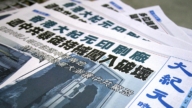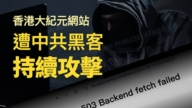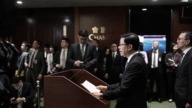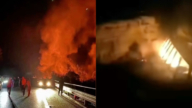【新唐人2011年6月17日訊】北京中央銀行最近公布一份調研報告說,從上世紀90年代中期到2008年,中共黨政、公安、司法幹部、國營企事業高管、駐外中資機構外逃、失蹤人員高達16000到18000人,攜款金額達8千億元人民幣。不過,學者專家指出,中共官員外逃人數和攜款金額,遠不止官方公開披露的數目。
這份名為《我國腐敗分子向境外轉移資產的途徑及監測方法研究》的報告,由央行反洗錢監測分析中心課題組2008年6月完成,日前獲得中國金融學會第九屆優秀金融論文及調研報告的一等獎。
6月14號,央行網站首次公布了這份報告,中外媒體和網站紛紛報導、轉載。但隨後,央行網站刪除了這份報告和獲獎公告,國內多個新聞網站的相關報導也都被刪除。
這份報告指出,貪官轉移資金的「重點關注地區」有:北美、澳大利亞、東南亞、以及與中國無引渡協議的小國等18個地區。而香港、澳門成為「主要中轉地區」。
報告列舉貪官向境外轉移資產的8種方式:包括現金走私、替代性匯款、經常項目造假、海外投資、信用卡消費、離岸金融中心、海外直接收受、透過境外特殊關係人轉移等。
報告列舉中國銀行廣東開平支行三位原行長許超凡、余振東、許國俊,三人出逃美國攜款高達4億8千3百萬美元,余振東在8年裡,通過在香港開設公司來轉移資金。
這份報告引起中國網民的熱議,網民認為貪官外逃捲款遠不止8千億。人民網《強國論壇》的網友說:「0.4%的人聚集了70%的財富,如果這些人轉移資產,13億勞動者的血汗將付之東流。」。
北京理工大學經濟學教授胡星斗說:在目前「國進民退」的形勢下,國有企事業成為腐敗和兩極分化的根源。
胡星斗:「儘管我們也已經制定了反洗錢法等等,但是事實上資金外逃恐怕一年比一年更加嚴重。」
據《新華網》的報導,國家級貧困縣江西鄱陽縣,去年(2010年)全縣財政收入只有4.1億元。最基層幹部、縣財政局建設股股長李波華,一家四口逃往加拿大之前,留下了一封信,詳細描述了他如何從國家專項賬戶中,套取近億元資金的作案手法。
時政評論家曹長青說:中國財富向海外逃亡或轉移,已經越來越形成了一個大潮。
曹長青:「今天無論是勤勞致富的人,還是貪腐的人,紛紛都把要錢轉到美國去,最後一個大的共同點,就是對中國的制度、前景,沒有確定性,所以感到不保險,恐懼將來會怎麼樣。」
胡星斗教授指出,中共政治體制是一個利益共同體,官官相護,「反腐敗」之所以不見成效,因為「反腐敗」已淪為排除異己、權力鬥爭的手段。正如民間流傳的:「反腐敗會亡黨,不反腐敗將亡國」。
美國哥倫比亞大學政治學博士李天笑,呼籲中共官員退出中國共產黨:「據一般的報導來說,現在發現已經有120萬左右的中共高官的家屬已經出逃到國外,實際上中共中上層的人他已經意識到,預計共產黨會崩潰,可能馬上就要到來;所以在這種情況下,就迫不及待的尋找出路。最保險的就是要重新做人,退出中國共產黨。」
《未來10年》(The Next Decade)的作者、美國戰略預測專家喬治•弗裡德曼最近表示,中國面臨諸多的問題,其中之一是「兩極分化」導致10億以上人口像非洲一樣貧困生活,社會不滿情緒不斷高漲,中共壓迫國民加劇危機。他對中國的評價是崩潰,而不是崛起。
新唐人記者李元翰、肖顔綜合報導。
=====
Missing RMB800 Billion
Beijing’s Central Bank recently released a report
spanning from mid-1990s to 2008, within the CCP
(Chinese Communist Party) and government,
public security bureau, judicial cadres, state-owned
enterprises, and overseas Chinese-funded institutions,
the number of missing persons is around
16,000-18,000, with a total of RMB800 billion
missing with them. Scholars point out that missing
officials and money are far more than this figures.
Monitoring Corruption: Assets Transferred’ was
reported by Central Bank’s Anti-Money Laundering
Monitor and Analysis Center in June 2008.
It won first prize in the 9th best financial
papers and research report contest.
On June 14, the Central Bank website published
the report, and soon Chinese and foreign media
reproduced it. Shortly after, Central Bank websites
deleted the report and award announcements.
All related reports were also deleted.
As per the report, funds were transferred to Australia,
North America, Southeast Asia, and small countries
without an extradition agreement with China.
Hong Kong and Macao were “major transit areas."
he report listed 8 ways of asset transfer,
including cash smuggling, alternative remittance, overseas
investment, account frauds, credit card expenses,
offshore financial centers, foreign direct receiving,
and transfers through “special people" overseas.
The report listed three former presidents of Kaiping
branch, Bank of China – Xu Chaofan, Yu Zhendong
and Xu Guojun. The three fled to the US
with $483 million. Yu Zhendong set up Hong Kong
companies to transfer funds over 8 years.
The report caused hot discussions amongst netizens,
who believed that cash flown overseas was far more
than RMB800 billion. On People’s Website,
one netizen commented: “0.4% of Chinese
gather 70% of the wealth, if they transfer assets,
Hu Xingdou, professor of economics
at Beijing Institute of Technology, said to VOA
that state-owned enterprises became sources
of corruption and polarization. “Although we have
developed an anti-money laundering law,
capital flow overseas is now more serious annually."
According to Xinhua reports, Poyang County,
a state-level poor county in Jiangxi, had revenues
of only RMB0.41 billion in 2010. A grass-roots
cadre, the Chief of Construction in the county’s
Finance Bureau, Li Bohua, left a letter before fleeing
to Canada with his family. The letter gave a detailed
description on how he took almost RMB100 million
from a special national account.
Current affairs critic Cao Changqing believes
that Chinese wealth flow or transfer overseas,
has formed a tide. VOA reported, “Today both
hard-working rich people and corrupt officers want
to transfer their money to the US. The biggest
concern is that China’s system and future
is uncertain. They fear to know the future."
Professor Hu Xingdou pointed out CCP’s political
system is a community of interests. “Anti-corruption"
has been ineffective, and has become a method
to eliminate dissidents and to stir conflicts.
As a popular saying goes: “Anti-corruption will kill
the CCP, but corruption will kill the country."
Li Tianxiao, Ph.D. in Political Science
at Columbia University, New York, called
upon Chinese officials to quit the CCP.
He told Radio Sound of Hope: “According
to general reports about 1.2 million families
of high-ranking officials have fled overseas.
Top CCP cadres have realized that the CCP will die
soon, and they’re looking for a way out eagerly.
The best way is to quit CCP and protect themselves."
Author of “The Next Decade", George Friedman,
also a US strategic forecaster, said China faces many
problems. Polarization leads to more than
1 billion people living in poverty like Africa.
Social discontent is growing, and CCP’s oppression
is increasing the national crisis. Friedman believes
there will be a collapse of China, rather than a rise.
NTD reporters Li Yuanhan and Xiao Yan.






























